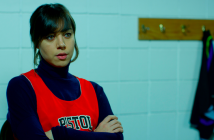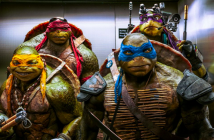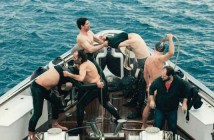
Calvary (2014)
Cast: Brendan Gleeson, Chris O’Dowd, Kelly Reilly
Director: John Michael McDonagh
Country: Ireland | UK
Genre: Comedy | Drama
Official Trailer: Here
Editor’s Note: Calvary is out in limited release this Friday, August 1st.
Genre has never lent itself terribly well to Irish cinema: the folklore is too fairy-filled for horror; the war never hit hard enough for noir; the absence of guns makes almost absurd the idea of action. To have made of Calvary a full-fledged western, then, is quite the accomplishment for the sophomore filmmaker John Michael McDonagh, who broke box office records with The Guard in 2011. He has made a far finer film this time, a caustic comedy that dredges the depths of the Irish social and spiritual consciousness and finds surprising truths in the process. In the shadow of Sligo’s Dartry Mountains, a range he renders an Irish answer to Monument Valley, he has found the new Fenian frontier.
McDonagh’s Ireland—for all the sublime sheen Larry Smith’s lensing lends it—is an ugly and angry place, its communities crumbling as its core’s corruption’s revealed and old Catholic order gives way to embittered agnostic abandon.
 There’s nary a crisis in the country he doesn’t tip his hat toward, from the financial frailties that plague the land still to the incessant onslaught of sex abuse scandals seeping out of the church. McDonagh’s Ireland—for all the sublime sheen Larry Smith’s lensing lends it—is an ugly and angry place, its communities crumbling as its core’s corruption’s revealed and old Catholic order gives way to embittered agnostic abandon. Amidst it all is Brendan Glesson’s Father James, a spiritual successor to High Noon’s solo sheriff, if one abandoned less for cowardice than contempt. The semantic distinction between signifier and signified may offer McDonagh his most satisfying running gag, but it’s an embittered laughter it breeds; “it’s our church” the padre prompts his flock, “not my church”.
There’s nary a crisis in the country he doesn’t tip his hat toward, from the financial frailties that plague the land still to the incessant onslaught of sex abuse scandals seeping out of the church. McDonagh’s Ireland—for all the sublime sheen Larry Smith’s lensing lends it—is an ugly and angry place, its communities crumbling as its core’s corruption’s revealed and old Catholic order gives way to embittered agnostic abandon. Amidst it all is Brendan Glesson’s Father James, a spiritual successor to High Noon’s solo sheriff, if one abandoned less for cowardice than contempt. The semantic distinction between signifier and signified may offer McDonagh his most satisfying running gag, but it’s an embittered laughter it breeds; “it’s our church” the padre prompts his flock, “not my church”.
It’s our mess, is the implication, and the Sunday-to-Sunday stretch across which the action unfolds as the priest awaits the assassination he’s warned of by his killer in the opening scene doesn’t so much offer a mystery to be solved as a moral mess to be untangled. Dour beneath his bushy beard, Gleeson’s is a face apt of a film that’s comedy only to a cynical sort; if the same strained un-PC provocation of The Guard is about at the start, it’s an affectation soon abandoned as the story shapes up. This is by no means the movie its trailers tout it, and the minute McDonagh stops trying to make it so and gives in to his darkly dramatic urges is that in which it hits its stride, and strikes the nerves of those both on and under the screen.
…from the figure of this Father and the physicality that makes Gleeson’s so striking a performance, Calvary is a complicated dialogue on the direction of displeasure.
 It’s a drastically dark work at heart, just as moodily measured as its leading man and every bit as enigmatic too. He’s fascinating foremost for the things we don’t learn; in a film so empathetic toward anti-ecclesiastical anger, it’s interesting to see his faith taken for granted. An Irish alternative to Winter Light the movie most certainly ain’t, and from the figure of this Father and the physicality that makes Gleeson’s so striking a performance, Calvary is a complicated dialogue on the direction of displeasure. The black and white binary of the priest’s cassock makes for an aptly ironic answer to the ten-gallon hats of yore; and if man’s been made in God’s image, well He can’t be much good at all.
It’s a drastically dark work at heart, just as moodily measured as its leading man and every bit as enigmatic too. He’s fascinating foremost for the things we don’t learn; in a film so empathetic toward anti-ecclesiastical anger, it’s interesting to see his faith taken for granted. An Irish alternative to Winter Light the movie most certainly ain’t, and from the figure of this Father and the physicality that makes Gleeson’s so striking a performance, Calvary is a complicated dialogue on the direction of displeasure. The black and white binary of the priest’s cassock makes for an aptly ironic answer to the ten-gallon hats of yore; and if man’s been made in God’s image, well He can’t be much good at all.
So suggest the men that populate this tale, well-played by a host of talent from Dylan Moran and Chris O’Dowd to Aiden Gillen and even M. Emmett Walsh. His pistol-pulling plot contributions aren’t alone in invoking old Americana. Even the west of Ireland has met the wider world; in this film, a drama as sombre as it is spiritual, Catholic guilt lingers long in the wake of Catholic guile, and the scorn’s as much a recognition of the role of religion in Irish identity as a resentment. The distinctive mountain that looms over the landscape might make for a fine name for the film, as it did for one of Yeats’ last poems: “Under Ben Bulben”. He’s buried beneath it, as sworn in his verse, which—like Calvary—takes stock of the Ireland it leaves in its wake, and finds a good deal to say in the process.
Many times man lives and dies
Between his two eternities,
That of race and that of soul,
And ancient Ireland knew it all.
Calvary dredges the depths of the Irish social and spiritual consciousness and finds surprising truths in the process.



